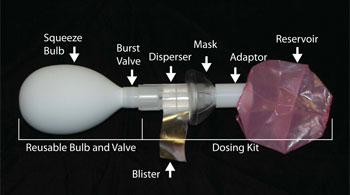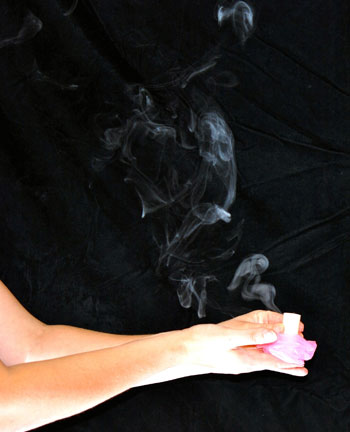
|
|
| Global Health Home | People | Projects | Contact |
| RESEARCH GROUPS @ CIRES > |
Group Projects: Developing New Inhalable Aerosol VaccinesMeasles VaccineOur team has reformulated the injectable Edmonston-Zagreb live attenuated measles virus vaccine, replacing sorbitol with myo-inositol to create an inhalable aerosol measles vaccine. Our patented CAN-BD® process was used to produce micronized measles vaccine dry powder with residual moisture levels of 0.3-1.3 percent. The dry powder vaccine is stable for at least 2 years at 2-8 ˚C and shows less than 1 log loss of virus infectivity at 37 ˚C for seven days. Our team has learned that inhaled myo-inositol powders and the new dry powder aerosol vaccine are not toxic in two animal models. Our team also determined that, fourteen months after groups of Rhesus macaques were immunized by at-liberty inhalation of the new vaccine aerosols through facemasks, they were fully protected from infection when challenged with wild-type measles virus. The team has developed two simple, low-cost active dry powder inhalers (DPIs). Plans have been made to start Phase I human clinical trials in the summer of 2010 after Indian regulatory approval is received. Presently several hundred children die each day in India from measles-related disease. Ten percent of all pre-school deaths in Indian children are still caused directly and indirectly by measles. In the improved CU-developed vaccine, the dry aerosolized and inhaled microparticles rapidly dissolve in the aqueous film in respiratory tracts, so no purified water for injection is needed. The dry powders are individually sealed in peelable blister packs or rupturable capsules to avoid bacterial contamination sometimes encountered when using multi-dose vials. Oral and sublingual Delivery MethodsWork has also begun to synthesize and compress microparticles into wafers for oral and sublingual delivery. Aerosols of Kanamycin and other tuberculosis antibiotics were also synthesized and characterized in 2009. HPV vaccine delivery of aerosols and dry powdersA 2010 CIRES Innovative Research Program grant helps us begin the work to prepare fine dry powders of a new vaccine against human papillomavirus (HPV). Despite the remarkable efficacy of the present HPV vaccines, their cost (approx. $360 for the initial three dose series) is prohibitive in low-resource settings. Furthermore, the current vaccines are injectable and require refrigeration, which also severely complicate effective delivery in resource-poor areas. Read more about this Innovative Research Program grant. Last updated: 5/2010 |
Our work is supported in part by the Foundation for the National Institutes of Health, as part of the Grand Challenges in Global Health Initiative created by the Bill and Melinda Gates Foundation, by Aktiv-Dry, by the CU Butcher Fund, and by the CIRES Innovative Research Grant program. |

